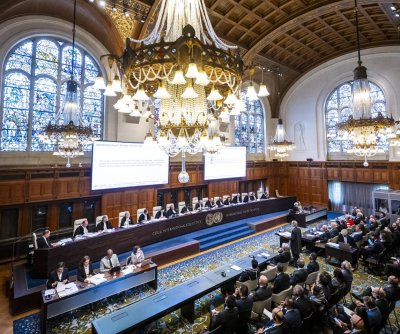The International Court of Justice (ICJ) concluded a week of public hearings involving numerous countries, addressing the legality of Israel’s near six-decade occupation of Palestinian territories. This high-profile case unfolded amid Israel’s conflict with Iran-backed Hamas in Gaza, prompting expedited proceedings.
The ICJ tasked 15 judges to provide a non-binding advisory on the legal implications of Israel’s occupation, settlements, and annexations in Gaza, the West Bank, and East Jerusalem since 1967. Presentations from 52 countries and three international organizations were heard in The Hague, with the court’s president announcing deliberations for an advisory opinion to be made public later.
Israel abstained from participation, arguing that the proceedings infringed on its right to self-defense and labeled the questions presented to the judges as a distortion of history and reality. Despite Israel’s absence, Palestine initiated arguments, emphasizing over a century of denial of the Palestinian people’s right to self-determination due to Israeli policies and occupation.
Foreign Minister Raid Malik of the State of Palestine, on the opening day of hearings, denounced Israel’s actions in Gaza as genocide, stressing the urgent need to end impunity and inaction.
U.N.’s Top Court Finishes Hearing About Israel’s Occupation (Credits: The New York Times)
The ICJ proceedings were prompted by a late 2022 U.N. General Assembly resolution mandating an examination of Israel’s illegal occupation following a U.N. Human Rights Council report that highlighted the illegality of Israel’s occupation under international law.
This resolution stemmed from growing international concern over Israel’s policies in Palestinian territories. Meanwhile, the ongoing conflict in Gaza, starting on October 7, has resulted in a substantial Palestinian death toll, according to the Palestinian Ministry of Health, underlining the urgency of addressing the situation.
The case underscores deep-rooted tensions and complex geopolitical dynamics in the Middle East, with implications extending beyond legal realms. It reflects the longstanding dispute over Palestinian statehood and self-determination, exacerbated by continuous violence and territorial disputes.
The ICJ’s forthcoming advisory opinion will likely influence diplomatic efforts and international discourse regarding the Israeli-Palestinian conflict, shaping future negotiations and potential resolutions.
The outcome of the ICJ proceedings will carry significant ramifications for regional stability and global peace efforts. The international community closely monitors developments, recognizing the need for a comprehensive and equitable resolution to the Israeli-Palestinian conflict.
As the court deliberates, stakeholders await its advisory opinion, hoping for a constructive step toward addressing longstanding grievances and advancing prospects for peace in the region.
